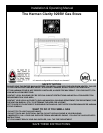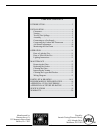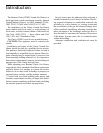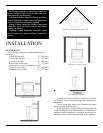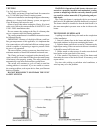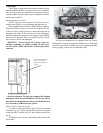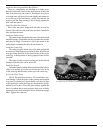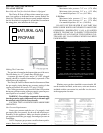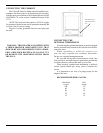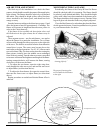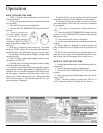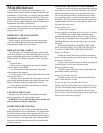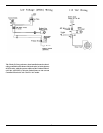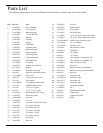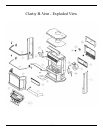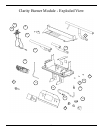
5
VENTING
Use Only Approved Venting
The Clarity gas heater is tested and listed for connection
to a 4" (100 mm) listed Class B venting system.
If the unit is installed to vent through an approved masonry
chimney or a factory-built chimney system, an approved
Class B chimney liner must be used.
Observe local codes when venting the Clarity. If no local
codes exist, follow the current edition of ANSI Z223.1 and
CAN1- B149 installation codes.
Do not connect the venting to the ue of a chimney that
serves a separate solid-fuel burning appliance.
The venting manufacturer's installation instructions must
be followed exactly.
IMPORTANT: Because of the high efciency and low
ue gas temperatures of this appliance, it is important that
it be connected to a well-sealed and efcient venting system
which is capable of registering a negative pressure while
the stove is in operation.
The most efcient venting systems are those that have a
minimum number of bends and minimal horizontal runs.
The Clarity gas heater is equipped with a thermally acti
-
vated vent safety switch that will shut down the main burner
if the heater is not properly venting. The safety switch will
automatically reset after the heater has cooled down.
The switch will continue to cycle off and on until the
venting problem is corrected. If you are unable to correct
the venting problem, seek expert advice from your Harman
dealer or installer.
DO NOT DISCONNECT OR BYPASS THE VENT
SAFETY SWITCH.
WARNING: Operation of this heater when not con-
nected to a properly installed and maintained venting
system or tampering with the vent safey shutoff system
can result in carbon monoxide (CO) poisoning and pos
-
sible death.
The Clarity gas heater is equipped with its own internal
draft hood so no additional external draft hood is required.
The heater should be installed so that the draft hood is in
the same atmospheric pressure zone as the air inlets to the
heater.
TEST FOR FLUE SPILLAGE
A spillage test should always be made at the completion
of the installation.
1. Start all exhaust fans in the home and then close all
doors and windows in the room containing the heater.
2. Light the heater and allow it to run for 5 minutes on the
high output setting. If the convection air blower is installed,
it should be turned off for the test.
3. Hold a match or other source of smoke near the draft
hood outlet on the upper back of the stove.
4. If the smoke is not drawn in, turn off the heater and
determine the cause of the lack of draft. If necessary, seek
expert advice.
For sites with swirling or turbulent wind conditions, a
wind cap may solve the problem.



